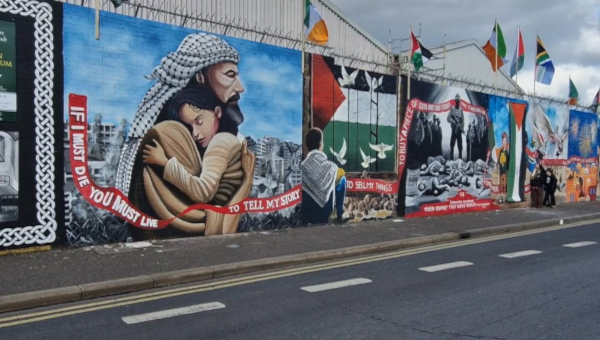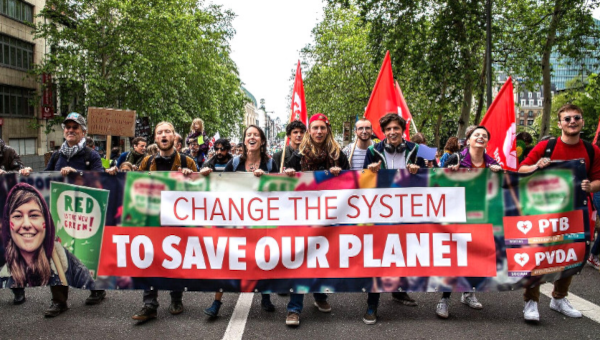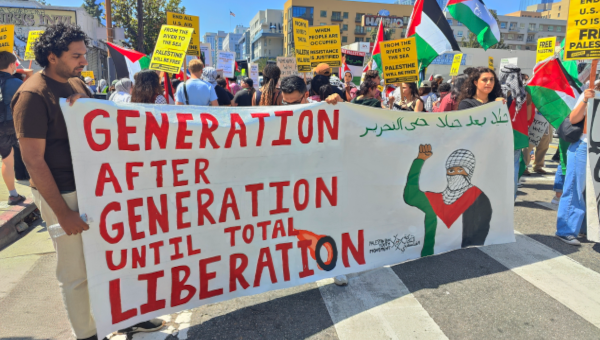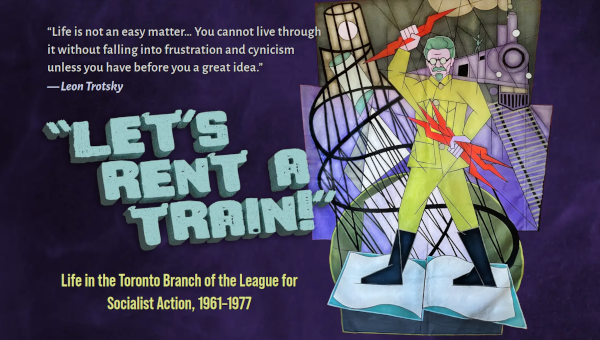A People’s Assembly: A Strategy for the Harper Years in Kingston
2011 is turning out to be ripe with paradoxes in Canada. The effects of the financial crisis of 2008 are now reverberating across Canadian society, as the financial crisis shifts into the public sector as private debt is replaced by public debt. This is leading to political and social polarizations unlike anything we have seen since the 1930s. This is in the context of systemic global crises: more than a billion people on the planet do not have enough to eat with agricultural systems the world over under severe strain; and global warming from carbon emissions, which reached their highest levels ever in 2010, underscoring the erratic weather scientists have been predicting for decades now.
Yet, in the midst of these crises so intimately linked to capitalism and its social relations, the past Canadian federal election has solidified the position of the Stephen Harper Conservatives, one of the most politically reactionary governments on the planet, with the growing support of 40 per cent of Canadian voters. With its firm Parliamentary majority, the Conservative government is going to continue to target and attack many of the policies and institutions that represent past victories of the left as it seeks to erase the deficit and lower corporate taxes on the back of the Canadian working classes.
The only positive aspect of these circumstances is that in times of crisis, people’s political orientations can change rapidly as political struggles shake up long encrusted attitudes and beliefs. The striking success of the New Democratic Party (NDP) in the election, with its unexpected breakthrough in Quebec and sudden emergence as the Official Opposition, represents, in part, just such a process. In defending ourselves and our programs against further neoliberal attacks, we can create opportunities to bring radically different ideas into people’s lives. These are the moments that if taken advantage of can allow for surges in self-organized activity among the exploited and oppressed.
A People’s Assembly in Kingston
At the same time, it is clear that parliamentary activity and contemporary social democracy is not a sufficient condition to form a new Left project as a viable alternative to neoliberal capitalism. This is a pivotal issue in all Canadian cities. There is a need to push beyond the old sectarian politics of so much of the radical Left, and the organizational inability to form political organizations that are more lasting and capacity-building than the uncountable number of coalitions, social forums, summit convergences, community networks, and so forth, that have been the defensive – and failed – responses to the neoliberal onslaught.
In Kingston, a medium sized Ontario city resting between Montreal and Toronto, it is even clearer that the electoral route is not currently a means to address the pressing needs of workers and their communities, or the demands of forming a Left that can become a presence in the city. Kingston was lucky to come out of the election with a Liberal candidate – with Ted Hsu who is about as good as they come in the Liberal camp – as Ontario veered strongly toward the Conservatives. This does not mean, however, that there are no important actions the left can take to continue to create the society we want and so badly need.

Kingston People’s Assembly co-founder Doug Nesbitt holds up a flip chart with notes from a workshop.
In the fall of 2010, many residents and left activists from Kingston and around the region worked to establish a People’s Assembly. This was inspired by similar organizational experiments taking place in other cities in North America, with Toronto (GTWA) and Ottawa (OWA) being the closest examples. It also represents the first attempt in Kingston to overcome levels of division on the local left that have been prominent at least since the anti-Iraq War initiatives failed to achieve their goals of building a strong local peace movement. Since then a number of very significant initiatives have taken place in Kingston that have without doubt made it a more supportive place for social activism and to live.
The federal and recent local elections absorbed a great deal of attention and energies, and now many are again wondering what impact a relevant and new organizational pole could have. As in many other communities, many activists are deeply involved in particular struggles and feel there isn’t the time to devote to anything else. This is a reasonable point, however, the question is whether we can have greater success in our own struggles if we also find ways to support others in theirs. At the same time, working together can create opportunities to learn from each other and recognize the ways our struggles are linked. There is also need to institutionalize a new political infrastructure to deepen our organizational capacities and ability to forge new resistances that don’t collapse into themselves after every mobilization.
4-Pronged Strategy
A Kingston People’s Assembly might consider a 4-pronged strategy that would help us move forward on important issues and place us in better shape to influence issues in the electoral system sometime down the road. Any future electoral strategy of the left, however, needs to be done in a way that strives for more meaningful forms of democracy in all layers of society. We certainly need to push for electoral reform, and a first step needs to be for proportional representation. But we also need to generate a more vibrant, transparent participatory culture in all aspects of life. For example, our public servants need to be constantly pressed to make day-to-day decision-making processes transparent and accountable.
There is significant overlap in the issues suggested below and they are not listed in any order of priority. However, the list does provide a map of many issues that have been engaging activists and suggestions of ways people can take action. It highlights the many possible ways we can coordinate with others to work toward a more egalitarian, healthy and non-oppressive society in Kingston.
1. Defending Public Sector Unions and Defending the Non-Unionized
The current Canadian Union of Postal Workers lockout is the first in a wave of battles to come. Kingston is a city with a significant number of public sector workers. It would be a mistake to assume this sector is incapable of radical, militant action. In many instances, the public sector is organizing in dynamic, fighting form. The rapid mobilizations in Wisconsin earlier this year are one example, but so are those across Europe, where in countries like Greece, Spain and Portugal public sector workers have been engaged in a range of general strikes and militant actions in defense of public services.
A People’s Assembly could link up with members of the Kingston District Labour Council to build a broader community basis in defense of public services. If we are aware of contracts that are coming up for renewal, we could create a timeline in advance and find ways of building greater awareness of the issues. We could also pinpoint common issues between unions and community groups to create more powerful, coordinated responses.
Other employment spaces in the Kingston area that need to be targeted are those industries that rely on precarious, non-unionized workers. There are currently large numbers of people working in big box stores, telemarketing and service industries forced into ‘part-time’ status, although the actual flows of work can range from 60 hours a week to just a few hours at minimum wage, thanks to prior Conservative labour law reform. Many are young people and new immigrants, as new labour market entrants dominate in this precarious work. But many are also older workers who would be retired by now if they had decent pension plans; for example, currently a buy-out of Zellars by Target is sending people with 30 years of work into unemployment without even severance pay.
The low income precariat are critically susceptible to the current rises in food prices and increases in energy costs in a city with very high rent. If efforts are not taken to increase their incomes, job security and protection against human rights violations in the workplace then we will have a population who are homeless with jobs. The limited access to public transit in the city greatly impacts this portion of the population. These are issues where social-movement unionism can have enormous impact. Toronto’s living wage campaign and free public transit campaigns are good examples to look to.
Defending the public sector also means supporting ongoing struggles at Queen’s University in Kingston. Queen’s is seriously indebted as a result of a planned building boom heavily funded by federal and provincial government funding schemes that poured money into infrastructure projects, but don’t allow for the faculty to fill them. In this way it functions as a slush fund for politicians to dole money out to construction firms and financiers. The management of this process, however, has been overseen by obscenely paid public administrators who suppressed numerous democratic processes in order to wrap the building projects up in enormous levels of debt that were overly optimistic in their economic forecasts. In many ways these loans were endemic to the funding formulas that came down from governments, stipulating that grants be matched by funds from the university. The result is that students are paying ever-increasing tuition while quality and working conditions deteriorate.
The only upshot to the situation at Queen’s is that the immediate impact on the funding packages of students and employees was the final domino resulting in the creation of two new unions on campus, which arose after years of painful organizing processes. These unions are already becoming hubs for new activists and have the potential to force debates in new areas. These fights ultimately relate to fights to maintain public education and to address the problems raised by the neoliberal university. These unions can therefore provide important links between the university and issues that extend into the broader community. Racism on campus is not separate from racism in the city more broadly. Housing costs affect all university workers and students. The topics of study are ultimately a battle between the interests of the corporate world and that of humanity in general. For example, Queen’s research develops technology for fracking that pollutes water and especially impacts the world’s poorest, and assists Canadian mining companies. This in turn impacts vulnerable communities around the world. Queen’s also supports various aspects of the military, policing and prison industries. It is also deeply linked to a medical industry that seeks profits from illness instead of promoting public health.
2. Creating a Livable City and Bio-Region
Defending the public sector is intimately connected with a range of actions we need to be building upon. Most crucially, we need to be building a city that can thrive in a post-peek-oil era and adjust to increasing climate change. A list of important issues that a Kingston Assembly might strategize and coordinate campaigns directed at City Council is as follows: improving access to public transit; supporting cycling and cycling infrastructure; community gardens and public space for all populations; phasing out fossil fuels, promoting alternative energy, conservation and reduction of waste; supporting local, ecologically and socially progressive agriculture: protecting the safety of our water sources and cleaning the great lakes system; supporting local arts, culture and celebratory spaces for building community; and supporting Kingston’s vibrant queer culture.
3. Supporting the Most Vulnerable
Conservative budget cuts are going to also be directed in ways that place more pressures on the poorest and most oppressed. Many extraordinary feminists in Kingston worked hard to establish women’s shelters to protect those facing domestic violence. Funding for these shelters needs to be maintained, and increased as job losses elsewhere in the economy will no doubt result in greater male violence. Other areas in need of action are: services for people with disabilities; homelessness; HIV support services; First Nations populations will need to continue to defend land against illegal dumps, mining exploration and other incursions on self-determination; refugees, immigrants and racial minorities in Kingston must not be victimized and need to be supported in a variety of ways; and as a centre for prisons, focus on prison reform as this population will grow with the new mandatory minimum sentencing bills intended to fill up new mega-prisons.
4. Global Justice
In recent decades, Canada has become a more aggressive imperialist state. This has followed on the increased internationalization of Canadian capital. It also follows from the set of decisions after 9/11 by Canada to accept the Bush Doctrine on U.S. exceptionalism and right to intervene militarily in other states, and to back this up with increased deployment of the Canadian military internationally. One example of the new context is the way Canadian mining company Bear Creek Mining has spurred protests in Peru and Bolivia that shut down 300 kilometers of highway because their mining plans threaten to poison the largest lake in Latin America. Another is how Barrick Gold in Tanzania recently faced a spontaneous occupation of its mine by as many as 1500 people, several who were then murdered. We then might also consider that our country’s position on the occupation of Palestine represents the worst obstruction to possible peace deals. And then of course we can consider our actions in NATO and Canadian military involvement in wars from Libya to Afghanistan.
Some immediate tasks that can be worked on in terms of global justice are the following:
- We must push for real actions on the boycott, divestment and sanctions campaign against Israeli Apartheid and the occupation of Palestine. Many have pension funds and affiliation with institutions that invest in apartheid.
- We have to work on changing the nature of international aid – while our current government hacks at will, lying to parliament in the process only to support policy motivated by Christian fundamentalist ideology rather than any assessments of reality.
- We need to work with others to prevent the profiteering off of disaster management.
- We should be defending Africans, Latin Americans and others against the horrendous practices of our mineral extractive industry.
Necessary Steps:
Building a More Radical Movement
It is really up to people in Kingston to decide if this initiative is worth returning to, but it seems there is much it could work on. If people decide it is not the time then I hope in the meantime we can carry on our own actions with these broader goals in mind. Working together requires mutual patience and respect. It is also necessary for us to avoid sectarianism and elitism among the existing activist left. Sectarianism is when people push a particular strategy as if it is the only way forward. Sectarianism usually is supported by detailed analysis of the past and of human behavior that imposes the past upon the present. Sometimes it also fetishizes the technological changes in our societies (e.g. the revolution must be twittered, and organized via facebook).
Elitism exists when those on the left feel they can only work with people who think just like them or have proven themselves through a particular course of action deemed to be radical or militant. Many of us on the left feel a desperate need to step up the level of resistance. The sharp turn to austerity in this phase of the economic crisis means more people are suffering daily. We want action now and know that past victories have been won through direct-action. The downside of this is that we can become frustrated with those who are not in the same place and not ready to take part in the same forms of action.
The term ‘radical’ means that our analysis and our actions should not address symptoms of the crisis, but actually address the underlying causes. Being ‘radical’ in action is not always about immediate dramatic and risky action. It is also about learning from each other, approaching people with a mutual level of respect, and steadily building new political capacities for resistance. We also need to be prepared to ally with people who may be politically liberal, but share a level of conviction for a particular issue. Yet when we do this we build trust, spaces for mutual learning and improve the chances of gaining support for other political causes we take on. The same thing could be said with those who are motivated by environmental issues, but aren’t there when we want to defend immigrants.
These are the issues that have been emerging in Kingston. There are similar dilemmas occurring in cities across Canada, although they are particularly acute in smaller cities where the Left has fragmented, from an already small base, into micro-campaigns that are struggling to gain traction to impact our communities directly, and join up with larger national and international campaigns. There is a need to hear more about what is going on, and begin a process of experimenting organizationally in Kingston and elsewhere. This is part of what the Left is doing around the world, as it reforms, and develops the anti-capitalist politics necessary to challenge neoliberalism in its current phase of austerity, of imposing the costs of the financial crisis on workers. We have a long road ahead of us, but coordinated left activism is only going to become more necessary in the coming years. So, we might as well get down to it. •





